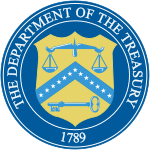| United States Under Secretary of the Treasury for International Affairs | |
|---|---|
 Seal of the United States Department of the Treasury | |
 Flag of an Under Secretary of the Treasury | |
since January 20, 2025 | |
| Department of the Treasury | |
| Style | The Honorable |
| Reports to | Secretary of the Treasury Deputy Secretary of the Treasury |
| Seat | Treasury Building Washington, D.C. |
| Appointer | President of the United States with Senate advice and consent |
| Term length | No fixed term |
| First holder | David C. Mulford |
| Website | Official website |
The Under Secretary of the Treasury for International Affairs is a high-ranking position within the United States Department of the Treasury that reports to, advises, and assists the Secretary of the Treasury and the Deputy Secretary of the Treasury on international economic issues and is often referred to as the U.S. Treasury’s top economic diplomat.
Contents
The Under Secretary leads the development and implementation of policies in the areas of international finance, trade in financial services, investment, economic development, international debt. It also leads the development of policies on U.S. participation in the International Monetary Fund, the World Bank, and the other multilateral development banks (including the Inter-American Development Bank, the African Development Bank, the Asian Development Bank, and the European Bank for Reconstruction and Development). The Under Secretary also coordinates international economic policies with the G7 and G20. [1]
